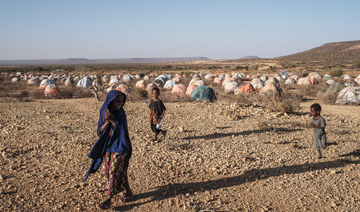NIAMEY, Niger: Leaders of West Africa’s regional bloc said Monday that they would meet later this week to discuss next steps after Niger’s military junta defied a deadline to reinstate the country’s ousted president while its mutinous soldiers closed the country’s airspace and accused foreign powers of preparing an attack.
The meeting was scheduled for Thursday in Abuja, the capital of neighboring Nigeria, according to a spokesman for the ECOWAS bloc.
State television reported the junta’s latest actions Sunday night, hours before the deadline set by ECOWAS, which has warned of using military force if the democratically elected President Mohamed Bazoum is not returned to power.
A spokesman for the coup leaders, Col. Maj. Amadou Abdramane, noted “the threat of intervention being prepared in a neighboring country,” and said Niger’s airspace will be closed until further notice. Any attempt to fly over the country will be met with “an energetic and immediate response.”
The junta also claimed that two central African countries were preparing for an invasion, but did not name them. It called on Niger’s population to defend the nation.
The coup toppled Bazoum, whose ascendency was Niger’s first peaceful, democratic transfer of power since independence from France in 1960. The coup also raised questions about the future of the fight against extremism in Africa’s Sahel region, where Russia and Western countries have vied for influence.
International airlines have begun to divert flights around Niger, which the United States and others had seen as the last major counterterrorism partner in the Sahel, south of the Sahara Desert, where groups linked to Al-Qaeda and the Daesh group are expanding their influence.
Also Monday, Mali said it and Burkina Faso, both neighbors of Niger run by military juntas, were sending delegations to Niger to show support. Both countries have said they would consider any intervention in Niger as a declaration of war against them.
The Associated Press saw several security officers from Burkina Faso at a hotel in Niger’s capital.
Regional tensions have mounted since Niger’s coup nearly two weeks ago, when mutinous soldiers detained Bazoum and installed Gen. Abdourahmane Tchiani, former head of the presidential guard, as head of state. Analysts believe the coup was triggered by a power struggle between Tchiani and the president, who was about to fire him.
It was not immediately clear what ECOWAS leaders will do now. The region is divided on a course of action. There was no sign of military forces gathering at Niger’s border with Nigeria, the likely entry point by land.
Nigeria’s Senate has pushed back on the plan to invade, urging Nigeria’s president, the bloc’s current chair, to explore options other than the use of force. ECOWAS can still move ahead, as final decisions are made by consensus by member states.
Guinea and neighboring Algeria, which is not an ECOWAS member, have come out against the use of force. Senegal’s government has said it would participate in a military operation if it went ahead, and Ivory Coast has expressed support for the bloc’s efforts to restore constitutional order.
The junta does not appear interested in negotiation. An ECOWAS delegation sent to Niger last week for hours of talks was not allowed to leave the airport and met only with Tchiani’s representatives.
The junta has also asked for help from the Russian mercenary group Wagner, which operates in a handful of African countries, including Mali, according to according to Wassim Nasr, a journalist and senior research fellow at the Soufan Center.
US officials say they are still able to communicate with Bazoum and that their most recent contact was Monday.
Two officials said the administration of US President Joe Biden intends to maintain both a diplomatic and military presence in Niger for the foreseeable future.
The administration is still weighing whether the developments amount to a coup, according to the officials, who spoke on condition of anonymity to discuss private diplomatic discussions. They said there was still time for Niger’s military leaders to reverse course.
If the US determines that a democratically elected government has been toppled by unconstitutional means, federal law requires a cutoff of most American assistance, particularly military aid.
Since the coup, extremists have been ecstatic because they are able to move around more freely without fear of attack, Boubacar Moussa, a former extremist fighter, told the AP. He had joined a nationwide program that encourages fighters to defect and reintegrate into society. The program’s fate is unclear.
Moussa said he’s received at least 10 phone calls from active militants in the Tillaberi region near the Mali border who said there’s been no concern about airstrikes. If there’s a military intervention by ECOWAS, they likely will attack the capital, Niamey, he said.
At a rally on Sunday, thousands cheered junta leaders who said their loyalty would be repaid.
“We are with you against them. We will give you the Niger that you are owed,” Brig. Gen. Mohamed Toumba said. After his speech, rallygoers beheaded a chicken decorated in the colors of former colonizer France.
The junta is exploiting anti-French sentiments to shore up its support base and has severed security ties with France, which still has 1,500 military personnel in Niger for counterterrorism efforts.
On Monday, France’s Ministry of Foreign Affairs formally discouraged any travel to Niger, Burkina Faso or Mali, and called on French nationals to be extremely vigilant. France has suspended almost $500 euros ($550 million) in aid to Burkina Faso.
It’s not clear what will happen to the French military presence, or to the 1,100 US military personnel also in Niger.
Many people, largely youth, have rallied around the junta, taking to the streets at night to patrol after being urged to guard against foreign intervention.
“While they (extremists) kill our brothers and sisters ... ECOWAS didn’t intervene. Is it now that they will intervene?” said Amadou Boukari, a coup supporter at Sunday’s rally. “Shame on ECOWAS.”
West African leaders will meet Thursday after Niger’s junta defies key deadline and shuts airspace
https://arab.news/jw32h
West African leaders will meet Thursday after Niger’s junta defies key deadline and shuts airspace

- The junta claimed that two central African countries were preparing for an invasion, but did not name them
- It was not immediately clear what ECOWAS leaders will do now
Indonesia’s president-elect seeks to boost defense ties with UAE

- Prabowo Subianto is set to succeed President Joko Widodo in October
- His visit to Abu Dhabi seen as a strategic move ahead of presidency
JAKARTA: Indonesia’s President-Elect Prabowo Subianto wants to boost defense ties with the UAE, his office said on Tuesday, as he made the first official trip to Abu Dhabi since winning the general vote.
Indonesia-UAE relations grew under incumbent Indonesian President Joko Widodo, who in 2021 secured an over $46 billion investment commitment from the Gulf state. A year later, the two countries signed a free trade deal, which came into force last September.
Subianto, a former special forces commander and Indonesia’s current defense minister, is set to succeed Widodo and take office in October following his landslide victory in the presidential election in February.
On Monday, he was in Abu Dhabi to receive the UAE’s highest civilian honor, the Order of Zayed, in recognition of his efforts in enhancing bilateral ties.
“I hope Indonesia-UAE relations will continue to develop and grow in accordance with the ambitions of the two countries in strengthening cooperation across various fields, including in defense,” Subianto said in a statement after meeting UAE President Sheikh Mohammed bin Zayed Al-Nahyan.
During Subianto’s time in office as minister, Indonesia and the UAE agreed to strengthen defense ties with the signing of a memorandum of understanding in 2020, followed by a protocol agreement on the development of their defense industries in 2022.
Subianto’s visit to the UAE can be seen as a strategic move ahead of his presidency.
“As we get closer to his inauguration, Prabowo has gained a boost in confidence to directly meet with MBZ and discuss strategic issues at the bilateral, regional and global level,” said Teuku Rezasyah, an international relations expert from Padjadjaran University in West Java.
“It’s only natural that Prabowo is visiting Abu Dhabi because it’s one of the world’s biggest sources of foreign investments … Certainly, Prabowo wants to seriously guarantee that investments from Abu Dhabi will be very strategic in the development of Indonesia.”
India sets sights on Iranian port as gateway to Afghanistan, Central Asia

- New Delhi signed a 10-year deal to operate Chabahar port on Monday
- India began helping Iran to develop Chabahar in 2016
NEW DELHI: India’s newly signed deal to operate the Iranian port of Chabahar is expected to provide it a gateway to landlocked Afghanistan and Central Asia, offering possible competition to Pakistan’s Gwadar.
The 10-year contract, under which India will invest $120 million in Chabahar’s infrastructure, was signed in Tehran on Monday between the state-owned Indian Ports Global Ltd and the Port & Maritime Organization of Iran.
India’s Shipping Minister Sarbananda Sonowal welcomed the deal, saying the development of Chabahar was an “India-Iran flagship project” and that the port would be a “gateway for trade with Afghanistan and broader Central Asian countries.”
New Delhi’s commitment to Chabahar started in May 2016 when Iran, India, and Afghanistan signed a trilateral transit agreement to develop the port into a regional trade hub.
“The signing of the deal signifies the strength of bilateral ties between India and Iran,” said D.P. Srivastava, who was India’s ambassador to Iran when talks on the project started.
“The present agreement will build on progress achieved so far.”
India’s 2016 involvement in Chabahar came after the US eased sanctions on Iran. The sanctions were reimposed by Donald Trump’s administration in 2018.
After the signing of Monday’s agreement, US State Department spokesperson Vedant Patel told reporters that the sanctions on Iran remained in place, and that Washington would enforce them.
Prof. Sujata Ashwarya from the Centre for West Asian Studies at Jamia Millia Islamia in New Delhi said it was not likely that sanctions would affect India, as its presence was helping deter China — the main rival of the US — from becoming involved in the Iranian port.
“(India) will effectively keep China out of the project,” Ashwarya said. “If we are there, then China won’t be there, and the US would not impose sanctions.”
Located in Iran’s southeast, Chabahar is less than 100 km from Gwadar in southwestern Pakistan — a flagship project of the multibillion-dollar China–Pakistan Economic Corridor under Beijing’s Belt and Road Initiative.
Ashwarya said the Iranian port is Gwadar’s potential competitor.
“It is an investment in trade facilitation with an eye on making Chabahar a hub,” she said.
“It provides competition to Gwadar, it could potentially lead to a secured corridor to Afghanistan and Central Asia, which means that India’s trade with these regions can flourish and broaden.”
Haldiram’s: India’s beloved snack maker eyed by foreign investors Blackstone, UAE wealth fund

- Haldiram’s started in 1937 from “tiny shop” in Bikaner in desert state of Rajasthan
- Haldiram’s has almost a 13% share of India’s $6.2 billion savoury snacks market
From fried Indian snacks to local sweet delicacies, family-run Indian snack maker Haldiram’s has long been one of the country’s most popular food brands. Now, foreign investors like Blackstone and Abu Dhabi Investment Authority want a big bite of it.
Haldiram’s was last year also an acquisition target for India’s Tata Group, one of the country’s biggest conglomerates.
Here are some facts about the popular Indian brand:
* Haldiram’s started in 1937 from a “tiny shop” in Bikaner in the western desert state of Rajasthan. It later expanded to New Delhi in 1983.
* The company’s website says it has 1,000 distributors and its products are available in 7 million outlets. It also exports to many foreign countries including Japan, Russia, United Kingdom and Australia.
* One of its most popular snacks is “bhujia,” a crispy fried Indian snack made with flour, herbs and spices and sold for as little as 10 rupees (12 US cents) across mom-and-pop stores. Haldiram’s calls it “an irresistible Indian snack” which can “captivate your taste buds.”
* Haldiram’s started exporting products in 1993. The US was its first market, where it began with 15 savoury products, and later, in 2016, opened its first overseas factory in the UK.
* Beyond snacks, Haldiram’s also sells ready-to-eat and frozen foods such as Indian curries and rice items. It also runs more than 150 restaurants which sell street-style Indian food, as well as Chinese and western cuisine.
* Last year, during deal talks with Tata, Haldiram’s was seeking a $10 billion valuation. Reuters has previously reported Haldiram’s annual revenues are around $1.5 billion.
* Haldiram’s has almost a 13% share of India’s $6.2 billion savoury snacks market, Euromonitor International estimates.
($1 = 83.5200 Indian rupees)
Internally displaced people reached 76 million in 2023 – monitoring group

- Almost 90 percent of the total displacement was attributed to conflict and violence
- The group reported a total of 3.4 million movements within Gaza in the last quarter of 2023
GENEVA: Conflicts and natural disasters left a record nearly 76 million people displaced within their countries last year, with violence in Sudan, Congo and the Middle East driving two-thirds of new movement, a top migration monitoring group said Tuesday.
The Internal Displacement Monitoring Center report found that the number of internally displaced people, or IDPs, has jumped by 50 percent over the past five years and roughly doubled in the past decade. It doesn’t cover refugees — displaced people who fled to another country.
The report tracks two major sets of information. It counted 46.9 million physical movements of people in 2023 — sometimes more than once. In most of those cases, such as after natural disasters like floods, people eventually return home.
It also compiles the cumulative number of people who were living away from their homes in 2023, including those still displaced from previous years. Some 75.9 million people were living in internal displacement at the end of last year, the report said, with half of those in sub-Saharan African countries.
Almost 90 percent of the total displacement was attributed to conflict and violence, while some 10 percent stemmed from the impact of natural disasters.
The displacement of more than 9 million people in Sudan at the end of 2023 was a record for a single country since the center started tracking such figures 16 years ago.
That was an increase of nearly 6 million from the end of 2022. Sudan’s conflict erupted in April 2023 as soaring tensions between the leaders of the military and the rival Rapid Support Forces broke out into open fighting across the country.
The group reported a total of 3.4 million movements within Gaza in the last quarter of 2023 amid the Israeli military response to the Oct. 7 attacks in Israel. That means that many people moved more than once within the territory of some 2.2 million. At the end of the year, 1.7 million people were displaced in Gaza.
Group director Alexandra Bilak said the millions of people forced to flee in 2023 were the “tip of the iceberg,” on top of tens of millions displaced from earlier and continuing conflicts, violence and disasters.
The figures offer a different window into the impact of conflict, climate change and other factors on human movement. The UN refugee agency monitors displacement across borders but not within countries, while the UN migration agency tracks all movements of people, including for economic or lifestyle reasons.
Pakistan PM unveils broader plan to sell most state-owned firms

- Announcement comes amid talks on new IMF loan
- There can’t be any strategic commercial SOEs, says ex-minister
ISLAMABAD: Pakistan will privatise all state-owned enterprises, with the exception of strategic entities, Prime Minister Shehbaz Sharif said on Tuesday, broadening its initial plans to sell only loss-making state firms to shore up its shaky finances.
The announcement came after Sharif headed a review meeting of the privatization process of loss-making state enterprises (SOEs), according to a statement from his office, which discussed a roadmap for privatization from 2024 to 2029.
“All of the state-owned enterprises will be privatised whether they are in profit or in losses,” Sharif said, adding that offloading the SOEs will save taxpayers’ money.
The statement didn’t clarify which sectors would be deemed strategic and non-strategic.
The announcement came a day after an International Monetary Fund (IMF) mission opened talks in Islamabad for a new long-term Extended Fund Facility (EFF), following Pakistan’s completion of a $3 billion standby arrangement last month, which had averted a sovereign debt default last summer.
Privatization of loss-making SOEs has long been on the IMF’s list of recommendations for Pakistan, which is struggling with a high fiscal shortfall and a huge external financing gap. Foreign exchange reserves are hardly enough to meet up to a couple of months of controlled imports.
The IMF says SOEs in Pakistan hold sizable assets inn comparison with most Middle East countries, at 44 percent of GDP in 2019, yet their share of employment in the economy is relatively low. The Fund estimates almost half of the SOEs operated at a loss in 2019.
Patchy success so far
Past privatization drives have been patchy, mainly due to a lack of political will, market watchers say.
Any organization that is involved in purely commercial work can’t be strategic by its very nature, which means there can’t be any strategic commercial SOEs, former Privatization Minister Fawad Hasan Fawad told Reuters on Tuesday.
“So to me there are really no strategic SOEs,” he said.
“The sooner we get rid of them the better. But this isn’t the first time we have heard a PM say this and this may not be the last till these words are translated into a strategic action plan and implemented.”
Islamabad has for years been pumping billions of dollars into cash-bleeding SOEs to keep them afloat, including one of the largest loss-making enterprises
Pakistan International Airline, which is in its final phase of being sold off, with a deadline
later this week to seek expressions of interest from potential buyers.
The pre-qualification process for PIA’s selloff will be completed by end-May, the privatization ministry told Tuesday’s meeting, adding discussions were underway to sell the airline-owned Roosevelt Hotel in New York.
It also said a government-to-government transaction on First Women Bank Ltd. was being discussed with the United Arab Emirates, and added that power distribution companies had also been included in the privatization plan for 2024-2029.
“The loss-making SOEs should be privatised on a priority basis,” Sharif said.




















